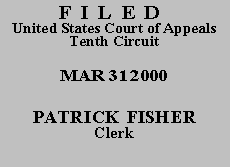

| GREGORY LYNN BARBER,
Petitioner-Appellant, v. STEVE HARGETT, Respondent-Appellee. |
|
Petitioner Gregory Lynn Barber appeals the district court's dismissal of his petition for a writ of habeas corpus, brought pursuant to 28 U.S.C. § 2254, on the ground that it was not timely filed. Because petitioner has not made a substantial showing of the denial of a constitutional right, we deny his application for a certificate of appealability and dismiss the appeal.
In November 1993, petitioner was convicted in Oklahoma state court of Murder in the First Degree and Shooting with Intent to Kill, after former conviction of two or more felonies, for which he is serving sentences of life without parole and 1000 years respectively. The Oklahoma Court of Criminal Appeals affirmed his convictions on August 10, 1995, and they became final ninety days later, on November 9, 1995, when the time for applying for certiorari review lapsed.
On April 24, 1996, the Antiterrorism and Effective Death Penalty Act of 1996 (AEDPA) took effect, significantly amending the habeas corpus statutes. One such amendment imposed a one-year limitation on a state prisoner's right to bring a federal habeas action, running from the date the prisoner's conviction became final. See 28 U.S.C. § 2244(d)(1)(A). The one-year limitation is to be tolled, however, during the time that a "properly filed" post-conviction proceeding is pending in state court. See id., § 2244(d)(2). To avoid the unfairness of retroactively imposing this one-year limitation on state prisoners whose convictions became final before the AEDPA's effective date, we recognized a one-year grace period within which such prisoners could file their federal habeas petitions. See Hoggro v. Boone, 150 F.3d 1223, 1225-26 (10th Cir. 1998). This one-year grace period is subject to the § 2244(d)(2) tolling rule during the pendency of a "properly filed" post-conviction proceeding. See id. at 1226 & n.4.
Under these rules, petitioner had until April 24, 1997 to file his federal habeas petition, unless he had a "properly filed" state post-conviction proceeding pending which would toll the time limit. On April 23, 1997, petitioner filed an application for post-conviction relief in the state district court. This served to toll the limitations period one day before it was to expire. On June 12, 1997, the state court denied post-conviction relief. Petitioner admits that his appeal of the state court decision was not "properly filed." Therefore, the time in which petitioner had to file his federal habeas action began to run upon the state court's denial of post-conviction relief, giving him just one more day in which to file his habeas petition. Petitioner failed to file the petition until June 8, 1998, nearly a year later. On this basis, the magistrate judge to whom this matter was assigned recommended dismissing the petition as untimely, and the district court adopted the recommendation.
Petitioner attempts to obtain a certificate of appealability by arguing that in his case, the time limitation operated as an unconstitutional suspension of the writ because he made a colorable showing of actual innocence. After reviewing petitioner's submissions to the district court, however, we agree that he "failed to set forth evidence creating even a reasonable probability that the jury convicted the wrong man." R., doc. 13 at 5. We conclude, therefore, that petitioner has not made a substantial showing that he was denied a constitutional right. See Miller v. Marr, 141 F.3d 976, 978 (10th Cir.) (holding that the one-year limitation might raise constitutional concerns only under limited circumstances such as incompetence or actual innocence), cert. denied, 525 U.S. 891 (1998).
Petitioner's application for a certificate of appealability is DENIED, and the appeal is DISMISSED.
Entered for the Court
Circuit Judge
*. This order and judgment is not binding precedent, except under the doctrines of law of the case, res judicata, and collateral estoppel. The court generally disfavors the citation of orders and judgments; nevertheless, an order and judgment may be cited under the terms and conditions of 10th Cir. R. 36.3.